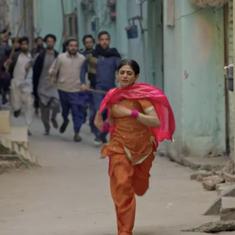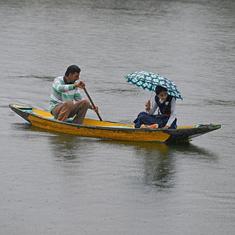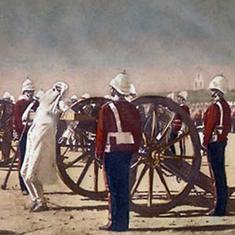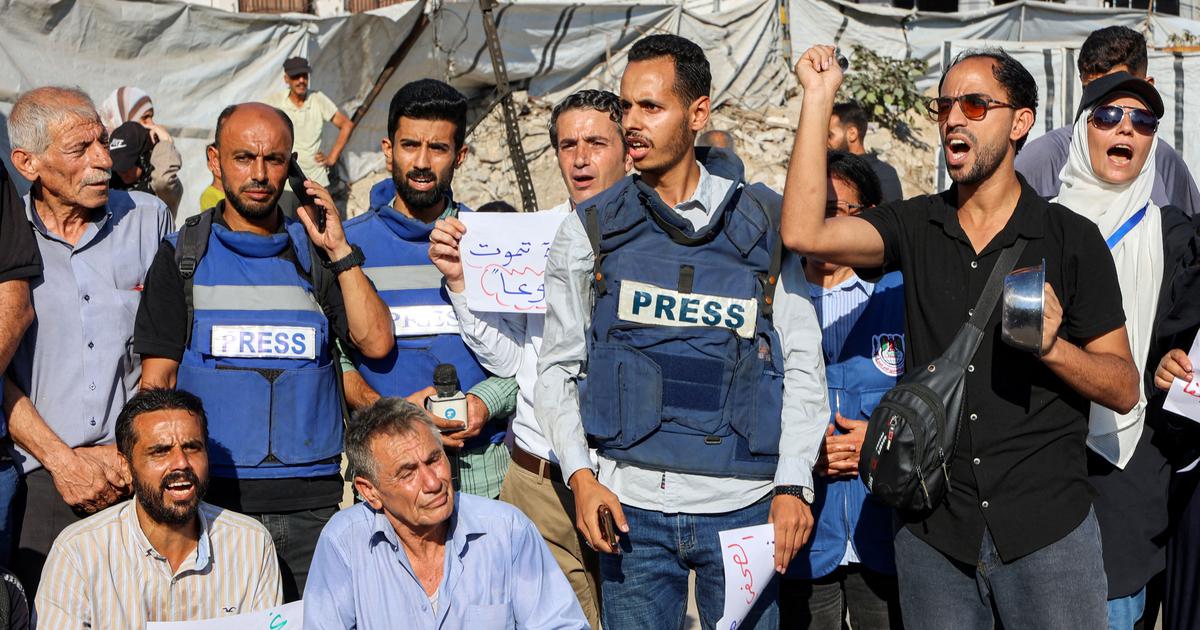On October 7, 2023, hours after Palestine group Hamas led unprecedented incursions into southern Israel, killing 1,195 people and taking about 250 hostage, Palestinian photojournalist Mohammad al-Salhi was shot dead while reporting on Tel Aviv’s reprisal on Gaza.
The 29-year-old al-Salhi had been wearing his press vest and helmet. He had grown up in the Bureij refugee camp, near a fence separating Gaza from Israel. This barricade, a “symbol of division and apartheid” became a “recurring theme in his work”, said one online tribute to him.
The same day, at least two more Palestinian journalists were killed in the course of work.
The deaths were roundly condemned. The Unesco director-general noted that “media workers provide verified news in times of conflict and must therefore be protected against all forms of attack”.
The Israelis ignored the advisory. By the end of the fortnight, 24 journalists were among the 6,000 Palestinians killed by the Israelis in Gaza. As Israel’s attacks continued and casualties mounted, 141 media workers were dead by December 2024 – and the toll in the territory had risen to 46,376.
Estimates of the number of media workers killed since Israel began its war on Gaza vary from 186 (according to the Committee to Protect Journalists) to 232 (according to the Costs of War Project run by the Watson Institute for International and Public Affairs).
During those 21 months, Israel has flattened large portions of Gaza. At least 92% of all homes have been destroyed or damaged, the United Nations says, as have 70% of all structures – schools, universities, hospitals, administrative buildings and businesses.
More than 90% of Gaza’s population has been displaced, some as many as 10 times. The majority of Gazans have little access to regular supplies of food, water or adequate healthcare. Since October 2023, the territory’s population is estimated to have fallen by 6% – about 100,000 residents have fled, while almost 60,000 have died.
Because Israel has tightly controlled foreign journalists visiting Gaza, the world has relied on Palestinian media workers to report on the horror being visited on the territory.
The killings of these journalists is not a coincidence. Israel’s stranglehold on the media is part of its strategy to project its ruthless attacks on Gaza as a just war.
Tel Aviv has acknowledged that it has assassinated some journalists, claiming that they were “terrorists” who were aiding Hamas. Other journalists, say their colleagues, have been deliberately targeted.
As Palestinian journalist Ibrahim Abu Ghazaleh told The Intercept after an Israeli strike on a cafe where reporters gathered to work, “In Gaza, a camera is a threat. When you witness the truth, you become a target.”
Earlier this week, as the effects of Israel’s tight control of food convoys into Gaza intensified the spectre of starvation, four Western news organisations issued an alarming joint statement.
“We are desperately concerned for our journalists in Gaza, who are increasingly unable to feed themselves and their families,” said The Associated Press, AFP, BBC News and Reuters. “For many months, these independent journalists have been the world’s eyes and ears on the ground in Gaza. They are now facing the same dire circumstances as those they are covering.”
As a result of the courageous reporting from Gaza, there is evidence that the conscience of some world leaders is finally being pricked. This week, France became the first G7 nation to announce that it would recognise the state of Palestine. In the United Kingdom, 221 members of parliament signed a letter asking their prime minister to follow suit. On the street, millions of people across the Western world have participated in marches demanding justice for Palestine.
None of this is likely to move Israel to end its occupation of Palestine. As it persists with its campaign to starve Gaza, Tel Aviv knows that starving Palestinian journalists along with the rest of the population reinforces the barricade that hides from the world the full extent of its crimes against humanity.
Here is a summary of the week’s top stories.
Dhankhar’s exit. The Election Commission on Wednesday started preparations to conduct the election for a new vice president, two days after Jagdeep Dhankar resigned from the post. Dhankhar had cited medical reasons for stepping down with immediate effect on Monday, which was the first day of the Monsoon Session of Parliament.
A day after Dhankhar resigned, Prime Minister Narendra Modi wished him good health and said that the Rajya Sabha chairperson had “got many opportunities to serve our country in various capacities”.
Several Opposition leaders raised questions about the timing of Dhankhar’s resignation. Congress leader Jairam Ramesh said that there were “far deeper reasons” behind Dhankhar’s decision.
Samajwadi Party MP Javed Ali Khan said that Dhankhar had appeared in good health on Monday and that “it did not seem like there was a health issue”.
In search of justice. The Supreme Court stayed a Bombay High Court order acquitting 12 persons accused in the 2006 Mumbai train blasts case. However, it said that those who were released following the verdict will not have to go back to jail while the matter is being heard.
The case pertains to the seven bomb blasts in suburban trains on Mumbai’s Western Railway line on July 11, 2006, killing 189 persons and injuring 824.
Following a trial under the Maharashtra Control of Organised Crime Act, a special court had in October 2015 convicted the 12 persons. However, on Monday, the High Court acquitted all of them holding that the prosecution had “utterly failed” in establishing their guilt. Five of the accused persons had been sentenced to death.
The Maharashtra government challenged the acquittal on Tuesday.
Vineet Bhalla explains why the Bombay High Court acquitted all 12 convicted in 2006 Mumbai train blasts.
A trade deal. India and the United Kingdom have signed a Comprehensive Economic Trade Agreement. The free trade agreement will benefit Indian farmers, the micro, small and medium enterprises sector, footwear and jewellery exports, as well as the seafood and engineering goods sectors, Prime Minister Narendra Modi said.
UK Prime Minister Keir Starmer said that the trade deal would help British workers in cutting-edge manufacturing, and would also benefit whiskey distillers across Scotland and the service sector in London, Manchester and Leeds.
New Delhi and Britain had announced the agreement in May after more than three years and 14 rounds of negotiations. The free trade agreement was signed during Modi’s visit to the UK.
Also on Scroll last week
- EC began Bihar roll revision without data and shifted goalposts midway, court document shows
- ‘They knew I was innocent’: Men acquitted of 2006 Mumbai train blasts rue years lost in jail
- ‘Hindus will suffer more’: BJP’s ‘Bangladeshi’ politics could alienate its refugee vote in Bengal
- Swept away by glacial flood, Sikkim dam is being rebuilt – but lives downstream remain shattered
- ICJ delivers an unambiguous order on states’ responsibilities to halt climate change
- Why newly-independent India barred an official from accepting a Cuban honour
- How I help my students understand the links between complex medieval history and today’s India
- How Bengali Harlem’s lost history challenges America’s immigration certainties
- ‘Saiyaara’ is a surprise blockbuster only for those who weren’t watching closely
- In ‘Pyre’, an elderly couple face loneliness, the prospect of death – and their love for each other
Follow the Scroll channel on WhatsApp for a curated selection of the news that matters throughout the day, and a round-up of major developments in India and around the world every evening. What you won’t get: spam.
And, if you haven’t already, sign up for our Daily Brief newsletter.










